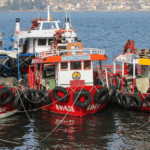The EU recognises Taiwan’s reforms put in place during the last three and a half years to tackle illegal, unreported and unregulated fishing (IUU).Today the European Commission decided to lift the yellow card acknowledging the progress made by Taiwan and the major upgrade of its fisheries legal and administrative systems to fight against IUU fishing.
The EU is committed to the fight against illegal, unreported and unregulated fishing and is working with countries across the world to that end. After the issuing of the yellow card in October 2015, the European Commission, on behalf of the EU, and Taiwan have engaged in three and a half years of intense cooperation and dialogue.
As a result of that cooperation, Taiwanese authorities now have a broad range of modern and efficient tools to fight IUU fishing in place. This is a major step forward, given that Taiwan’s long distance fleet is the second largest in the world, and therefore plays a central role in the international supply chain for fisheries products. Taiwan has also reinforced obligations imposed on Taiwanese operators owning fishing vessels flagged to third countries.
To keep building on these achievements, the Commission will propose the establishment of a dedicated IUU Working Group. This forum will allow both sides to maintain a close cooperation on matters relating to the fight against IUU fishing, including at the multilateral, regional and sub-regional levels.
In addition, the EU and Taiwan will continue addressing labour conditions in the fishing sector in the framework of their human rights consultations.
Background
The global value of illegal, unreported and unregulated fishing (IUU) is estimated at 10-20 billion euros per year. Every year, between 11 and 26 million tonnes of fish are caught illegally, corresponding to at least 15% of the world catches. The EU is the world’s biggest importer of fisheries products.
Fighting IUU fishing is part of the EU’s commitment to ensure sustainable use of the sea and its resources, under the common fisheries policy. It is also an important pillar of the EU’s ocean governance strategy, aiming to improve the international governance of the oceans.
Commission actions are based on the EU’s ‘IUU Regulation’, which entered into force in 2010[1]. Pursuant to its provisions, only fisheries products that have been certified as legal, can access the EU market. The Regulation also provides for specific dialogue mechanisms with the countries that are not in a position to provide such assurance or to discharge their obligations as Flag, Coastal, Port and Market State under international law. The prime objective of these dialogues is to rectify the existing shortcomings, through appropriate support to the third countries concerned. Hence, they often lead to new and committed partners in the fight against IUU fishing.
Since November 2012, the Commission entered in formal dialogues with 25 third countries, i.e. officially warned them of the need to take effective action to fight IUU fishing (pre-identification or yellow card). In most cases, significant progress was observed and therefore the Commission could satisfactorily close the formal dialogue phase and give them a green card. Only a few countries have not shown the necessary commitment to reforms until now. As a result, fisheries products caught by their vessels cannot be imported into the EU (identification or red card).
For More Information
Questions and Answers on Illegal, Unreported and Unregulated fishing in general and in Taiwan
Overview of Illegal, Unreported and Unregulated fishing procedures with third countries







Leave a Reply